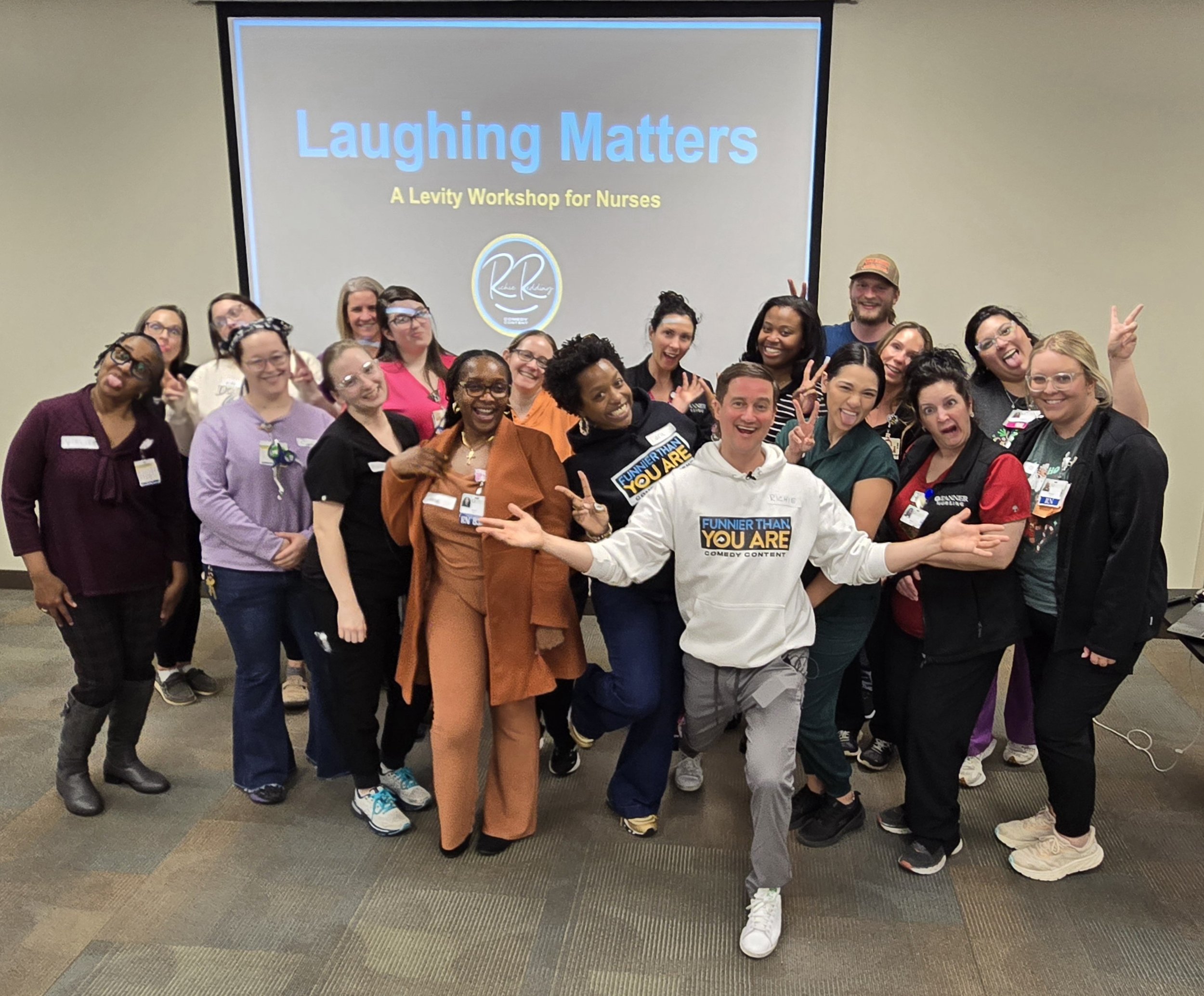The Nursing Apocalypse Is Coming
800k Nurses Plan To Leave the Profession in the Next Three Years
Patients give bad reviews when nurses don’t listen to them: The first 3 HCAHPS questions are about nurses listening. We help nurses build trust with patients by actively listening.
Low patient satisfaction scores kill revenue: 5 star hospitals get $20 million more federal funding than 4 star hospitals. When patients trust their nurse, they give better reviews.
Nurses Eat Their Young: 78% of nurses surveyed agree with this statement. We teach a light hearted approach to help baby nurses get past the stress of their first two years.
Hospitals have a 20% annual turnover rate: Replacing a single nurse costs over $50k. That retention problem adds up to millions a year for the average hospital.
Levity Training Improves HCAHPS Scores!
Case Studies Show Big Results:
15% improvement for “Nurses Listening Carefully.”
9.3% increase for “Nurses Explaining Clearly.”
14% increase for “Would recommend this hospital.”
Laughing Matters
Empathetic Nursing
Active Listening: Demonstrating listening leads to lower recidivism, less preventable readmission and fewer medication errors.
The Levity Ladder: Patients might be scared and vulnerable. The goal is not to make people laugh, it’s to move them up the Levity Ladder so that they are joking with us.
Humanizing Ourselves: Offering patients a little piece of ourselves helps them to see us as human beings…not just stereotypes.
Positive Associations: Talking to patients about their favorite things achieves two goals. It reminds them that we’re listening AND they associate us with those things.
Perfect Patient Hand-offs: When a trusted source introduces someone, 65% of people have a better first impression of them. We teach you to set up the next nurse for a great relationship with their patient at hand-off!
Supervising Matters
Empathetic Leadership
Attention to Retention: The top reasons nurses are leaving the profession are “3 B’s” of Blame, Bullying and Burnout.
Lighthearted lessons: the best way to teach a lesson is by telling someone how you learned it yourself. It also makes supervisors human and more approachable.
Make It Stick: Supervisors break into teams and decide what must and must not happen in order to make positive changes take hold.
Gamify the Day: Supervisors come up with fun, non-monetary incentives to create team spirit amongst their teams.
How to Coach Up: Supervisors learn the importance of their words and how believing in a baby nurse can help them to stick with it.
Testimonials
Hear what the nurses are saying!
Richie Redding
He’s an award-winning comedian and a comedy consultant that helps brands and leaders connect with their audience through humor.
His family was deeply impacted by great nurses during the Covid 19 pandemic, when both of his in-laws were placed on ventilators. Laughing Matters is a way to give back to the community and ensure that more nurses develop the people skills that can change patients’ lives.
When Amazon Web Services wanted to inject humor into their internal education system, they called Richie. The same is true for Boston Consulting Group, Goldman Sachs, Stifel Financial, and Vista Outdoors. As a speaker, he has worked with hundreds of CEOs and executives to harness lighthearted leadership and build trust with levity.
The “info-taining” content his team of Emmy nominated comedians produces has garnered his clients millions of organic views and helped brands to 10x sales and 50x engagement.
Richie's comedy has appeared on HBO, NBC, Fox, AXS TV, Kevin Hart’s LOL Network and Food TV.
Richie’s Clients
The Research
Our workshops aren’t just fun and games. They are based on this book by brilliant PhDs!
This book focuses on the patient experience as a leadership strategy. It explores the relationships between coordinated care, expert leadership, provider-patient communications, and the patient experience. When clinical and nonclinical staff collaborate effectively, healthcare teams can improve patient outcomes, prevent medical errors, improve efficiency, and increase patient satisfaction.
Surprisingly, however, healthcare leaders tend to prioritize specific metrics to improve hospital performance and patient satisfaction even though patient experience and provider-patient communications are intertwined. Determining the most effective strategy for achieving higher levels of service quality and patient satisfaction can prove elusive for providers.
Consider the evidence: a survey in 2012 of more than 17,000 healthcare leaders in North America, for example, found that leaders’ perceptions did not always match the data, and many hospital leaders overestimated the performance of their hospitals.
Ten years later, in 2022, only a few providers integrated best practices to achieve high patient satisfaction which severely impacted CMS Hospital Star Rating. This has significant effects on profit margins since patients consider the star rating differentials in their choices of hospitals and are willing to pay upward of 17% extra for treatments in 5-star hospitals, a revenue generating source of income at times when hospitals have seen falling revenues (down 4.8%) and rising labor (up 37%) from pre-COVID-19 pandemic levels.


















